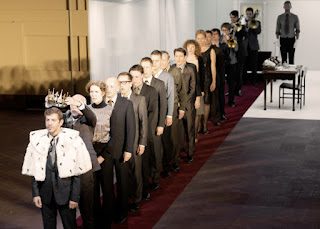So begin the Wars of the Roses in which the York branch of the family wrests the crown from the Lancastrian branch, only to have Richard III's (Hans Kesting) tyrannical rule turn the country against them.
Even at an epic running time the compression of five Shakespeare Histories means sweeping cuts to the plays especially, as ever, the Henry VIs - Part 1 is essentially explained away in a caption - and, taking his cue from Shakespeare's own laissez-faire attitude to historical accuracy, van Hove makes some plot tweaks as well - most notably the Duke of York himself (Bart Slegers) ascending the throne as Edward IV, rather than his son. The form the cuts have taken means the focus is on the behind-the-scenes politics that cold-bloodedly sends people to their deaths, Jan Versweyveld's set at first a vast war room, surrounded by hospital corridors which we see in a combination of live footage that follows the actors offstage, and pre-recorded segments seamlessly edited in. All the deaths take place in these corridors, usually by lethal injection.
The clinical approach didn't quite work for me in the first hour, which is the abridged Henry V - taking all the action out of a play built around it left it cold, although I liked how far to the extreme van Hove takes the view of Henry as brutal politician: Far from warm-hearted solidarity with the troops, Nasr screams his speeches into the mic in an overt Hitler parallel. The cold-blooded political landscape worked better for me once we got to the second hour and the Henry VI plays - with the king easily manipulated by Janni Goslinga's Margaret and her lover Suffolk (Robert de Hoog,) and the Yorkist faction plotting in the background.
By the time they've taken over in the second act, the set has become a palatial, carpeted living room as Edward IV and his family have become comfortable in their new power, but the danger now comes from within the family: The recent trend has been to see Richard III as the political enforcer who turns on his family because they're just the latest in the long line of inept rulers it's been his job to get rid of; but Kesting's Richard is a power-hungry narcissist, performing his soliloquies into a mirror, preparing for his coup by dressing up and, in the evening's funniest sequence, practicing dealing with other world leaders by making imaginary phone calls to Barack Obama and Angela Merkel. Richard III features some of the most effective use of the production's clinical aesthetic, like the fact that while we don't actually see the murder of the Princes in the Tower (Alwin Pulinckx and Harm Duco Schut*,) the camera sweeps unemotionally over their dead bodies after the event.
I was in the middle of the Upper Circle, which proved a perfect vantage point for reading the surtitles (the Dutch has been translated back into English rather than using the original Shakespearean text,) although the size of the stage did sometimes mean the amount going on was hard to follow: As well as the surtitles the stage is dominated by a large screen, sometimes showing what's going on backstage, sometimes zooming in on the reactions of an onstage actor, and between all that and the actors spread out across the stage I sometimes lost track of who was speaking. But the broad sweeps of the story certainly came across clearly even when I sometimes forgot to read the translations and just took in the performances, and while there's no denying this is an epic undertaking that demands a certain amount of commitment from the audience (there were quite a few interval escapees) van Hove and his company pull off a harsh look at power changing hands, but always seeming to end up with someone more dangerous than the last.
Kings of War, based on Henry IV Part 2, Henry V, Henry VI parts 1, 2 & 3 and Richard III by William Shakespeare, translated and adapted by Rob Klinkenberg, Bart van den Eynde and Peter van Kraaij, is booking until the 1st of May at the Barbican Theatre.
Running time: 4 hours 35 minutes including interval.
Photo credit: Jan Versweyveld.
*in case anyone accuses me of having forgotten what this blog's USP is, I should point out that as well as being quite good at The Acting this is not exactly a physically repellent cast. Toneelgroep Amsterdam are welcome to come back, especially if their dress code is along Song From Far Away lines:
Alwin Pulinckx (Exeter / Prince of Wales)
Harm Duco Schut (Williams / Prince Edward / Prince of York)
Robert de Hoog (Dauphin / Suffolk / Clarence)
and of course Eelco Smits (Grey / Henry VI)









No comments:
Post a Comment